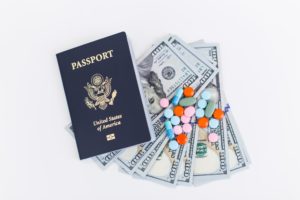 The hearings on Capitol Hill about drug prices were a big deal this week. To policy wonks. All the rage was the report by the National Academies of Sciences about policies to lower drug prices. There was lot of intriguing discussion, debate, and deliberation on things we should do. Many that I agree with! Blah, blah, blah, blah. Medicare should negotiate drug prices! We should make generics available quicker! We should clamp down on patent abuse by big pharma! More price transparency! Stop direct-to-consumer advertising! Blah, blah, blah…blah. All of this was a big deal. To policy wonks.
The hearings on Capitol Hill about drug prices were a big deal this week. To policy wonks. All the rage was the report by the National Academies of Sciences about policies to lower drug prices. There was lot of intriguing discussion, debate, and deliberation on things we should do. Many that I agree with! Blah, blah, blah, blah. Medicare should negotiate drug prices! We should make generics available quicker! We should clamp down on patent abuse by big pharma! More price transparency! Stop direct-to-consumer advertising! Blah, blah, blah…blah. All of this was a big deal. To policy wonks.
What about people today?!??!
Now I like talking policy – too much sometimes. But I’m not writing about that hearing. No way. I came across a little piece in the New York Times, which loudly reminded me of this fact: While Congress debates, activists act, and policy nuts pontificate on drug prices –foreign pharmacies are the solution that saves American lives NOW. This is indisputable.
Access to more affordable drugs keeps Americans out of the hospital, able to lead more productive lives – and living. That’s what the most conclusive research proves.
For that reason: There’s no doubt in my mind that properly verified Canadian and other foreign online pharmacies are a boon to public health because they are far cheaper than U.S. pharmacies. Just to be clear: It’s not just that they help Americans save hundreds of millions of dollars a year – maybe billions (wish I knew). They are saving lives.
The problem of people not taking prescribed medication is called medication nonadherence. It’s a crisis – even on par with the opioid crisis. After all, it costs the country an estimated $290 billion a year in additional healthcare costs and the loss of 125,000 lives. The only thing that has most proven to significantly help medication adherence is lower drug prices.
How about gadgets to remind you? Not so much. How about certain kinds of packaging that help organize dosing? A little. (Although blister packs may be safer than lose pills). Doctors with special devices to monitor their patients? Not really.
Drug prices anybody? The New York Times writes it like this: “Only one approach has repeatedly been shown to be effective: reducing the cost of medications.”
When you’ve been around this issue for as long as I have, it makes me want to scream “DUH!” I mean come on. Commonwealth Fund surveys for the past 15 years have shown that tens of millions of Americans don’t fill scripts because of cost. But here’s how the academic smart people say “cheap meds save lives”:
“Poor medication adherence produces large downstream health care costs. Thus, policymakers contemplating changes in health policy should take note of our assessment, from 5 consistent studies (moderate-strength evidence), that reducing patients’ out-of-pocket costs improves medication adherence.”
That’s from the Annals of Internal Medicine – a very sophisticated journal. Even the citation is sophisticated:
Meera Viswanathan, Carol E. Golin, Christine D. Jones, Mahima Ashok, Susan J. Blalock, Roberta C.M. Wines, et al. Interventions to Improve Adherence to Self-administered Medications for Chronic Diseases in the United States: A Systematic Review. Ann Intern Med. 2012;157:785–795. doi: 10.7326/0003-4819-157-11-201212040-00538.
Well, Canadian pharmacies and other international pharmacies help reduce Americans patients’ costs, so they must be saving lives and healthcare dollars. What about medication safety and quality? The FDA says that it can’t know for sure about medicines purchased online, internationally. That’s true because it’s beyond their current regulatory scope. However, it’s far from academic to strongly state that there is zero evidence to show or much to indicate at all that taking medications procured from licensed pharmacies, ones verified by PharmacyChecker, outside the U.S. – including foreign versions of FDA-approved drugs –are any less effective than getting them domestically. Evidence strongly suggests that the safest international online pharmacies are just as safe as the ones in the U.S.
Moreover, the sureness of the FDA is not what’s important when it comes to a free person’s decision to take or not take a medication based on cost. If millions of people decide that the medication costs in Canada are the threshold at which they will buy an essential medication, then those lower-cost pharmacies in Canada are helping alleviate our immediate medication adherence problem of high drug prices.
Or no—maybe Americans should spend their last dollars on the much more expensive U.S. medication because those are the ones that he FDA ensures are safe and effective. But millions simply won’t buy them at the highest prices. Look at the data.
Tagged with: National Academy of Sciences

